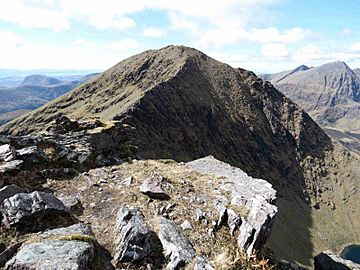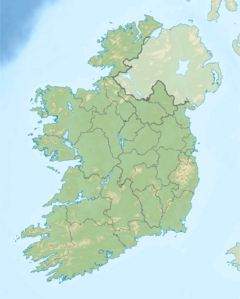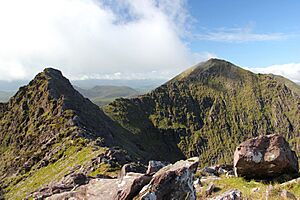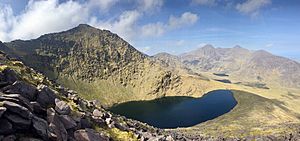Cnoc na Péiste facts for kids
Quick facts for kids Cnoc na Péiste |
|
|---|---|
| Knocknapeasta | |

The summit of Cnoc na Péiste seen from The Big Gun
|
|
| Highest point | |
| Elevation | 988 m (3,241 ft) |
| Prominence | 253 m (830 ft) |
| Listing | Marilyn, Furth, Hewitt, Arderin, Simm, Vandeleur-Lynam |
| Naming | |
| English translation | hill of the serpent |
| Language of name | Irish |
| Geography | |
| Location | County Kerry, Ireland |
| Parent range | MacGillycuddy's Reeks |
| OSI/OSNI grid | V835841 |
| Topo map | OSI Discovery 78 |
| Geology | |
| Mountain type | Well-bedded grey sandstone, (Lough Acoose Sandstone Formation) |
| Climbing | |
| Easiest route | Devil's Ladder (via Hag's Glen) |
Cnoc na Péiste (pronounced 'Knock-na-paysh-ta'), also known as Knocknapeasta, is a tall mountain in Ireland. Its name comes from the Irish language and means "hill of the serpent".
Standing at 988 metres (3,241 ft) high, it is the fourth-highest peak in all of Ireland. Cnoc na Péiste is part of the famous MacGillycuddy's Reeks mountain range. This range is located in County Kerry, in the southwest of Ireland.
It is one of the highest mountains in the eastern part of the Reeks. In 1943, during World War II, a United States Air Force plane crashed into the mountain. Sadly, all five crew members died. You can still see parts of the plane wreckage in a nearby lake called Lough Cummeenapeasta.
Contents
Exploring Cnoc na Péiste's Location
Cnoc na Péiste is the highest point in the eastern part of the MacGillycuddy's Reeks. This area has a long, narrow ridge with several mountain tops. The ridge eventually leads down towards the Gap of Dunloe.
To the southwest of Cnoc na Péiste is another peak called Maolán Buí, which is 973 metres (3,192 ft) tall. There's a fairly flat, grassy ridge connecting them. To the northeast, the mountain connects to The Big Gun (939 metres (3,081 ft)) and Cruach Mhór (932 metres (3,058 ft)) with a sharp, rocky ridge.
Lakes and Streams Around the Mountain
Between Cnoc na Péiste and The Big Gun, there are two small lakes. These are Loch Coimín Piast (also called Lough Cummeenapeasta) and Lough Googh. One lake is on each side of the mountain ridge.
A stream named Glasheencummeennapeasta flows north from Lough Cummeenapeasta. It goes into an area called Hag's Glen and joins the Gaddagh River. On the other side of the ridge, a stream flows south from Lough Googh into the Derrycarna River.
Climbing Cnoc na Péiste
Many people enjoy climbing Cnoc na Péiste. It is often climbed as part of a longer hike. This hike is usually a "horseshoe" route around the eastern Reeks. It starts from Hag's Glen and includes climbing Maolan Bui and The Big Gun.
Some very experienced hikers even climb Cnoc na Péiste as part of the much longer MacGillycuddy's Reeks Ridge Walk. This is a challenging route that covers many peaks in the range.
Mountain Classifications
Cnoc na Péiste is considered a "Marilyn" mountain. This means it stands out from the land around it by at least 150 metres. It's one of only two mountains in the Reeks over 3,000 feet tall that meets this special "Marilyn" rule. The other is Carrauntoohil, Ireland's highest mountain.
The Scottish Mountaineering Club also lists Cnoc na Péiste as a "Furth." A Furth is a mountain over 3,000 feet (about 914 metres) that is outside of Scotland but meets other important climbing rules. Cnoc na Péiste is one of 34 such mountains.
The 1943 Aircraft Crash
On December 17, 1943, during World War II, a sad event happened on Cnoc na Péiste. A United States Army Air Forces (USAAF) plane crashed into the northern side of the mountain. The plane was a Douglas C-47, also known as a Dakota.
The crash happened at about 7 AM, at an altitude of around 2,000 feet (about 610 metres). All five crew members on board died. The local police, called the Gardaí, didn't find out about the crash until February 3, 1944.
The next day, the Irish Army sent a team to recover the bodies. Today, you can still see parts of the plane wreckage on the mountainside. Some pieces are even in the lake below, Lough Cummeenapeasta. A special plaque has been placed by the lake to remember the victims of the crash.
 | Chris Smalls |
 | Fred Hampton |
 | Ralph Abernathy |




